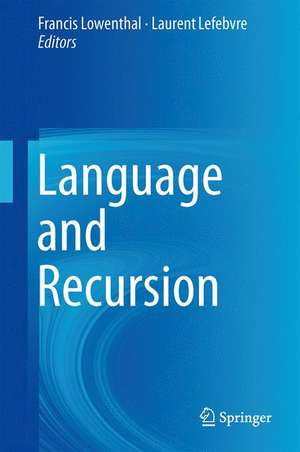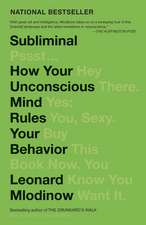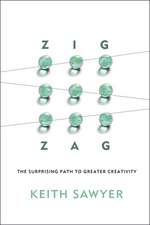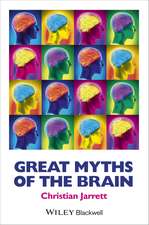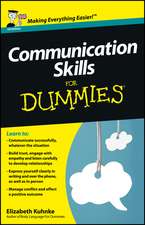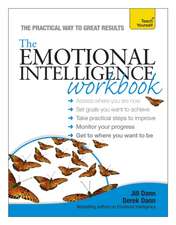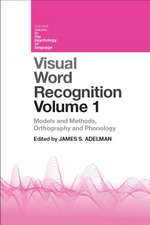Language and Recursion
Editat de Francis Lowenthal, Laurent Lefebvreen Limba Engleză Hardback – 25 noi 2013
| Toate formatele și edițiile | Preț | Express |
|---|---|---|
| Paperback (1) | 779.08 lei 6-8 săpt. | |
| Springer – 12 iul 2015 | 779.08 lei 6-8 săpt. | |
| Hardback (1) | 785.11 lei 6-8 săpt. | |
| Springer – 25 noi 2013 | 785.11 lei 6-8 săpt. |
Preț: 785.11 lei
Preț vechi: 957.44 lei
-18% Nou
Puncte Express: 1178
Preț estimativ în valută:
150.23€ • 157.17$ • 124.80£
150.23€ • 157.17$ • 124.80£
Carte tipărită la comandă
Livrare economică 03-17 aprilie
Preluare comenzi: 021 569.72.76
Specificații
ISBN-13: 9781461494133
ISBN-10: 1461494133
Pagini: 150
Ilustrații: XIX, 232 p. 63 illus., 27 illus. in color.
Dimensiuni: 155 x 235 x 20 mm
Greutate: 0.53 kg
Ediția:2014
Editura: Springer
Colecția Springer
Locul publicării:New York, NY, United States
ISBN-10: 1461494133
Pagini: 150
Ilustrații: XIX, 232 p. 63 illus., 27 illus. in color.
Dimensiuni: 155 x 235 x 20 mm
Greutate: 0.53 kg
Ediția:2014
Editura: Springer
Colecția Springer
Locul publicării:New York, NY, United States
Public țintă
ResearchCuprins
Section 1: What is recursion?.- Chapter I : Pragmatics as the origin of recursion.- Chapter II : Investigating recursion within a domain-specific framework.- Chapter III : Recursive cognition as a prelude to language.- Section 2 : Non Verbal Communication Devices, Implicit learning, Language and Recursion.- Chapter IV : Non Verbal Communication Devices, Language, Cerebral Flexibility and Recursive Exercises.- Chapter V : Computer simulations of recursive exercises for a Non-Verbal Communication Device.- Chapter VI : Implicit learning and recursion.- Section 3 : Emergence of Grammar in human and non human animal communication.- Chapter VII : Early rule learning ability and language acquisition.- Chapter VIII : Is there a brain basis of recursion ?.- Chapter IX : Primate communication: meaning from strings of calls.- Section 4 : About formal grammars and artificial Intelligence.- Chapter X : Unification and Efficient Computation in The Minimalist Program.- Chapter XI : Recursion in generative grammar.- Chapter XII : Computational Language Related to Recursion, Incursion and Fractal.- Section 5 : Philosophy, recursion and language.- Chapter XIII : Consciousness, Recursion and Language.- Chapter XIV : There is no recursion in language.- Section 5 : Synthesis of main discussions.
Notă biografică
Dr. Francis Lowenthal received his PhD from the Massachusetts Institute of Technology, and is the current head of the Cognitive Sciences Department at the University of Mons, Belgium. He is the director of the Cognitive Sciences Laboratory, and is the Chairman of the Council of the Institute of Language Sciences.
Dr. Lefebrve is an Assistant Professor in the Cognitive Sciences Department at the University of Mons, and Chair of the Graduate Studies in the School of Psychology and Education, University of Mons.
Dr. Lefebrve is an Assistant Professor in the Cognitive Sciences Department at the University of Mons, and Chair of the Graduate Studies in the School of Psychology and Education, University of Mons.
Textul de pe ultima copertă
As humans, our many levels of language use distinguish us from the rest of the animal world. For many scholars, it is the recursive aspect of human speech that makes it truly human. But linguists continue to argue about what recursion actually is, leading to the central dilemma: is full recursion, as defined by mathematicians, really necessary for human language?
Language and Recursion defines the elusive construct with the goal of furthering research into language and cognition. An up-to-date literature review surveys extensive findings based on non-verbal communication devices and neuroimaging techniques. Comparing human and non-human primate communication, the book’s contributors examine meaning in chimpanzee calls, and consider the possibility of a specific brain structure for recursion. The implications are then extended to formal grammars associated with artificial intelligence, and to the question of whether recursion is a valid concept at all.
Among the topics covered:
• The pragmatic origins of recursion.
• Recursive cognition as a prelude to language.
• Computer simulations of recursive exercises for a non-verbal communication device.
• Early rule learning ability and language acquisition.
• Computational language related to recursion, incursion, and fractals
• Why there may be no recursion in language.
Regardless of where one stands in the debate, Language and Recursion has much to offer the science community, particularly cognitive psychologists and researchers in the science of language. By presenting these multiple viewpoints, the book makes a solid case for eventual reconciliation.
Language and Recursion defines the elusive construct with the goal of furthering research into language and cognition. An up-to-date literature review surveys extensive findings based on non-verbal communication devices and neuroimaging techniques. Comparing human and non-human primate communication, the book’s contributors examine meaning in chimpanzee calls, and consider the possibility of a specific brain structure for recursion. The implications are then extended to formal grammars associated with artificial intelligence, and to the question of whether recursion is a valid concept at all.
Among the topics covered:
• The pragmatic origins of recursion.
• Recursive cognition as a prelude to language.
• Computer simulations of recursive exercises for a non-verbal communication device.
• Early rule learning ability and language acquisition.
• Computational language related to recursion, incursion, and fractals
• Why there may be no recursion in language.
Regardless of where one stands in the debate, Language and Recursion has much to offer the science community, particularly cognitive psychologists and researchers in the science of language. By presenting these multiple viewpoints, the book makes a solid case for eventual reconciliation.
Caracteristici
Bridges the gap between theoretical cognitive sciences and applied neuro- and psycholinguistics
All chapters include a synthesis of discussions
Contains high-quality and contemporary, relevant scientific information provided by renowned experts
All chapters include a synthesis of discussions
Contains high-quality and contemporary, relevant scientific information provided by renowned experts
